Jim Zeigler calls for restoration of PACT scholarship funds using BP settlement
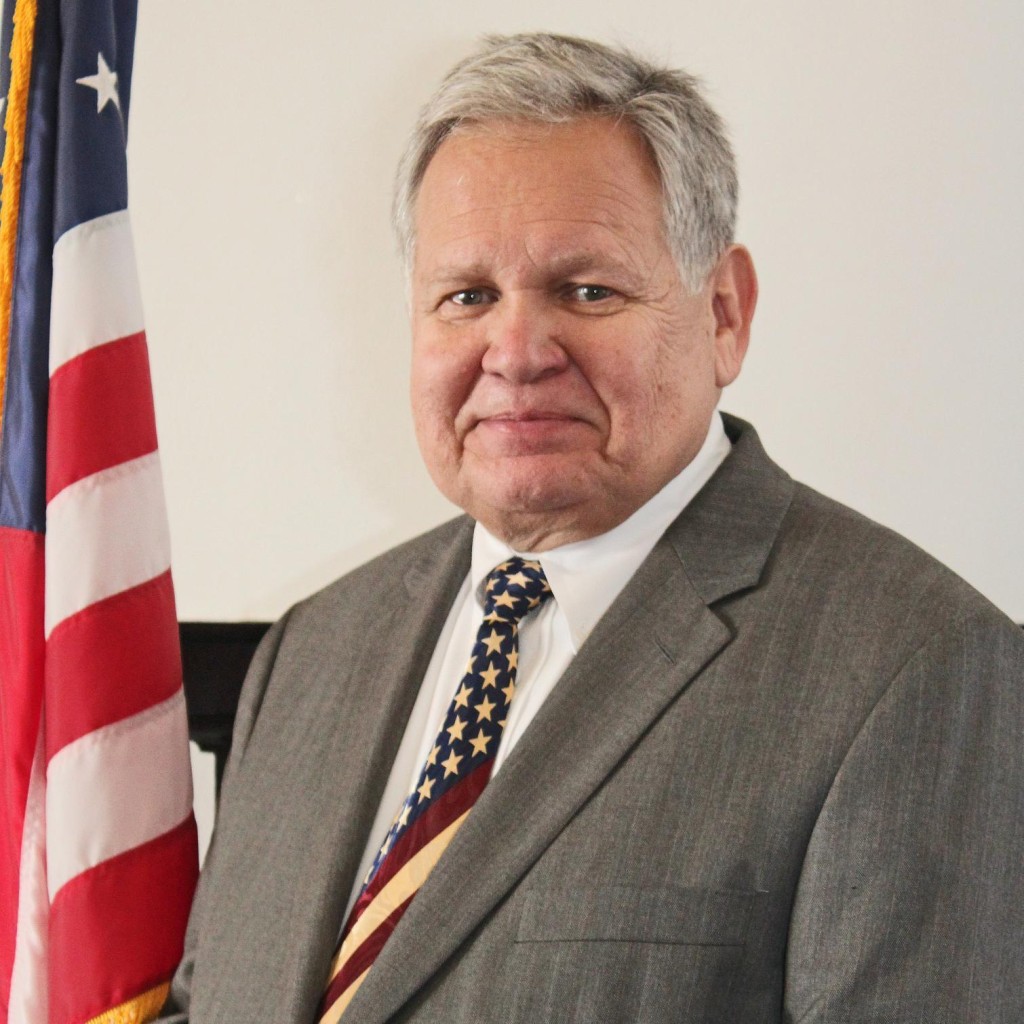
State Auditor Jim Zeigler has issued a call to lawmakers to include the restoration of a popular prepaid college tuition program to full funding in light of the recent $2.3 billion settlement between the state and British oil giant BP over the 2011 Deepwater Horizon spill that ravaged the Gulf of Mexico along Alabama’s coastline. As legislators gather again in Montgomery for a Special Session, Zeigler has added grievances by parents who were shortchanged by recent budget cuts to the list of Alabamians who may be made whole following the recent BP windfall. Meanwhile, lawmakers will attempt to sort out the ongoing state budget clash between statehouse leaders and Gov. Robert Bentley, who vetoed their first attempt at a plan to fund the state government for FY 2016-2017, Parents who prepaid for four-year college tuition plans under the state’s PACT — or Prepaid Affordable College Tuition — plan were abruptly told by state officials in 2009 that their purchases would no longer cover costs above what was covered the following year after the fund became insolvent. Zeigler has taken up their cause, arguing that their prepaid agreements with the state were not investments subject to loss, but pre-arranged contracts to be fulfilled by the state “at a sum certain.” Therefore said Zeigler, a retired lawyer, parents who purchased the plans but were denied coverage increases after 2010 are owed the differences they were forced to pay out-of-pocket despite earlier assurances to the contrary. With legislators such as Sen. Arthur Orr and Rep. Steve Clous already lining up to dedicate the bulk of the settlement to repay state debts, Zeigler said he isn’t asking for a special earmark, but simply for the state to pay what it had promised. “This is a wrong that needs to be righted. The BP money may be the last chance to provide the full tuition that these families paid for and based their planning on,” Zeigler said Monday evening.
Jeb Bush swipes at Hillary Clinton’s economic plan, says his will increase jobs
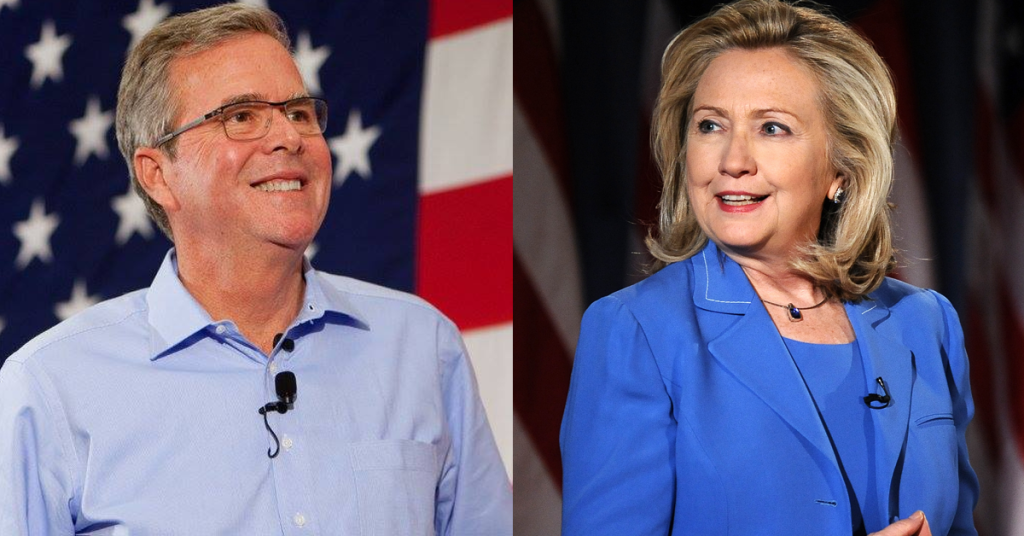
Former Florida Gov. Jeb Bush dismissed new economic proposals from Hillary Rodham Clinton on Monday, saying her plan would not improve the economy or boost wages. During an Iowa campaign stop, the GOP presidential hopeful said Clinton’s new economic agenda is a “continuation of the Obama economics, which has been a complete disaster.” Before more than 100 people gathered at Morningside College, Bush said he wants to overhaul taxes and regulations to expand the economy. He said he wants people with part-time jobs to get full-time work, if they want it. He touted his record in Florida, saying that he had cut taxes and increased jobs. “High, sustained economic growth has to be part of this answer, and Mrs. Clinton just has it wrong,” Bush said of the Democratic front-runner. Earlier in the day, Clinton outlined her economic plan in New York, pledging to crack down on Wall Street excess and offering support for a higher federal minimum wage. The former secretary of state criticized recent comments from Bush, who said last week in New Hampshire that “people need to work longer hours.” Clinton argued that people don’t need lectures, they need raises. Bush agreed that workers need raises, but said Clinton’s plans will suppress wage growth. “What we’re proposing is reforming regulation and taxes so that people’s income can grow. You can’t do that by creating policies where 30 hours is acceptable,” Bush said. During a question-and-answer session, Bush affirmed his support for increasing border security to prevent illegal immigration. He said he’ll provide a specific plan for reforming Social Security and Medicare. He also questioned a potential Iran nuclear deal. “I don’t see the benefit of this to be honest with you. We’re going to legitimize the regime that has made no commitment to free its own people,” Bush said. Bush is on his second trip to Iowa since he declared his candidacy last month. He appeared in Sioux City in the afternoon and was to attend a GOP dinner in Ames that night. He is scheduled to appear in Council Bluffs Tuesday. Republished with permission of The Associated Press.
Alabama lawmakers hold special session on budget
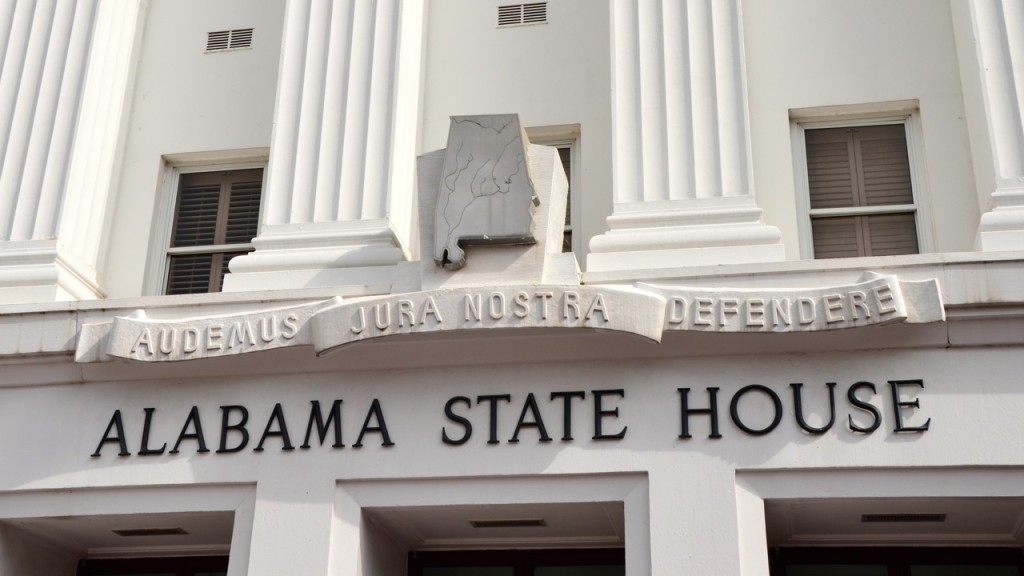
Alabama legislators on Monday began a special session on a looming budget shortfall during which Gov. Robert Bentley will again try to persuade Republican legislators to support tax increases over deep cuts to government services. Bentley is asking lawmakers to approve $302 million in revenue. Alabamians would rather have “minimal” tax increases, Bentley argued, over slashing state services in the fiscal year that begins Oct. 1. “They want to take care of mental health. They want their hospitals to stay open. The people of Alabama, I don’t care how conservative they are, they want those services, and we have to fund them,” the governor said. Bentley said legislators need to “step up” and show leadership. Legislators met for about 15 minutes and then adjourned until Aug. 3, saying committees needed time to work on budget ideas. The opening day of the special session also came with a renewed push for gambling legislation which, like Bentley’s tax bills, faces uncertain odds. The regular session ended last month in a political stalemate and without a budget. Bentley was unable to persuade lawmakers to approve tax increases and vetoed a spending plan that would have slashed $200 million from state agencies. He faces an uncertain outlook in Round 2 with legislators. House Speaker Mike Hubbard, R-Auburn, said the House will consider the governor’s proposals, but that the House and Senate need to take responsibility moving forward. “I believe that we will be working with the Senate in coming up with what we believe is a consensus and that we can get passed,” Hubbard said. “And it’s not to say that we’re not going to keep the governor informed, but that’s the way the separation of powers work. He is going to make some recommendations to us, but that’s all they are, recommendations.” Hubbard said he has not seen the specifics of Bentley’s proposals. “I don’t believe my members are inclined to vote for a bunch of new taxes,” Senate President Del Marsh, R-Anniston, said before lawmakers convened. The governor’s proposals include a cigarette tax and an adjustment to the business privilege tax. He also wants lawmakers either to approve a soda tax or do away with the FICA tax deduction from state income taxes. The opening day of the special session also highlighted ongoing differences between Bentley and Marsh. Bentley is trying to head off discussions of gambling legislation, excluding it from his special session call. Marsh on Monday introduced legislation to legalize a lottery and casinos. “I think if you check the temperature of the public, they are ready to vote on the issue one way or the other,” Marsh said. Marsh said he is not looking at the bill as a solution to next year’s shortfall, but said the state needs to have the conversation about gambling. Marsh introduced similar legislation in the regular session. He never sought a Senate floor vote, however, since it was clear he did not have the 21 votes needed to pass a constitutional amendment. The governor said he is not opposed to people voting on gambling at some point, but he said the state needs to look at budgetary changes first. The special session can last for up to 30 calendar days. The governor said he is prepared for a Round 3, saying he will call lawmakers back for another special session if needed. “We’ll see what they do over the next 30 days. If it doesn’t get solved, we’ll come back in August,” Bentley said. Upon the House and Senate adjournment, acting finance director Bill Newton addressed a joint meeting of the bodies’ budget committees. Afterward, Senate budget chair Arthur Orr, R-Decatur, didn’t have high hopes. “I think there are a lot of different forces at work in this special session. Any budget that properly funds state government will be difficult to fund properly,” Orr said. Republished with permission of The Associated Press.
Del Marsh to introduce gambling bill this Session
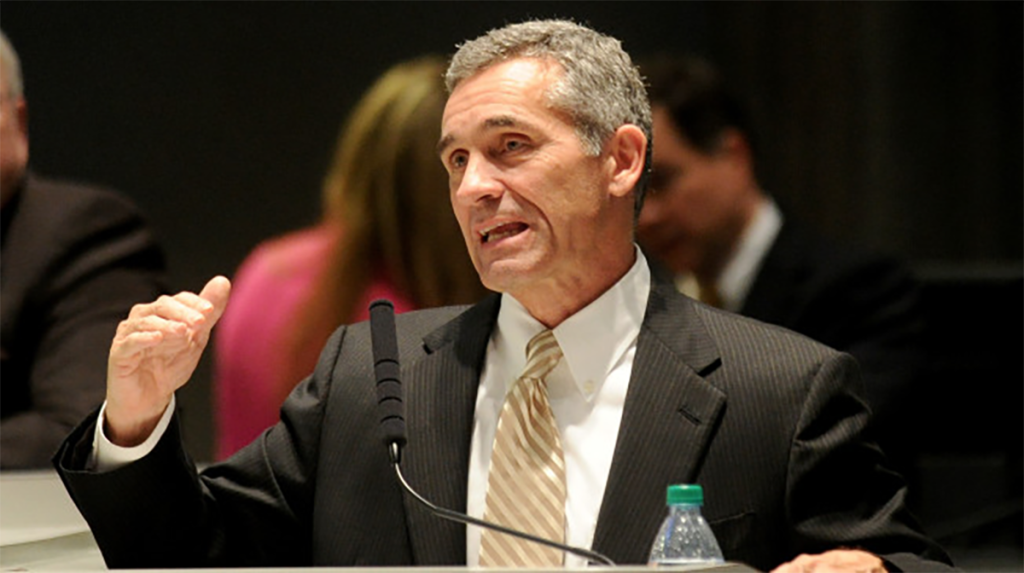
Senate President Pro Tem Del Marsh says he will introduce lottery and casino legislation this Special Session, saying he thinks the public is ready to vote on gambling. The Senate Republican leader planned to file the bill Monday, and will seek a floor vote if he thinks the votes are there. Lawmakers on Monday began a Special Session to resolve a projected fiscal year 2016 budget shortfall. Marsh said he is not looking at the lottery bill as a solution to next year’s shortfall. However, he said the state needs to have the conversation about gambling. Gov. Robert Bentley is trying to limit gambling discussions in the Special Session. Bentley is seeking $310 million in new revenue. The Special Session can last for up to 30 calendar days. Republished with permission of The Associated Press.
Email insights: Tuesday is “Go Set a Watchman” Day in Alabama

In case you’ve been living under a rock Harper Lee’s second book, Go Set a Watchman, is coming out tomorrow. The governor is making sure it gets the credit and welcome it deserves by declaring Tuesday “Go Set a Watchman” Day” statewide. If you missed it here’s a great article from AL.Com on the way reflections of Lee’s first book To Kill a Mockingbird, which includes Birmingham Mayor William Bell’s thoughts on the book and its influence. The governor issued a statement Monday about his proclamation: “The release of “Go Set a Watchman” is an exciting time for our state,” Governor Robert Bentley said. “To join the national and international excitement surrounding the book, I have proclaimed Tuesday as “Go Set a Watchman” Day in our state. Harper Lee is a great source of pride for our state, and the literary mark she has left on our state and nation should be commended. I am honored to issue this proclamation in recognition of her second book being released.” “To Kill a Mockingbird,” published in July 1960, was Harper Lee’s first published novel. The novel focused on segregation, tolerance and the trial of a black man falsely accused of raping a young white woman during the Depression era in rural Alabama. The novel went on to become an international bestseller, and was adapted for the screen in 1962. Earning eight Academy Award nominations, the movie version of “To Kill a Mockingbird” won four awards, including Best Actor for Gregory Peck’s portrayal of Atticus Finch. To date, “To Kill a Mockingbird” has been translated into 40 languages. In 1997, by joint proclamation of the Legislature, Monroeville, Ala., was designated as the “Literary Capital of Alabama” because of its history to produce many famous writers. The state of Alabama has a diverse and rich literary heritage, and is home to several Alabama-born authors. Alabama Tourism Director Lee Sentell commented that the impact of Alabama authors is an important segment of the tourism economy. “Harper Lee and other authors whose stories are set in Alabama are responsible for attracting many visitors who want to experience the towns they read about. Literary tourism is a growing segment of our hospitality industry,” Sentell said. To download the full proclamation click here: Go-Set-a-Watchman-Day-Proclamation
What’s happening this week in D.C.: July 13-17
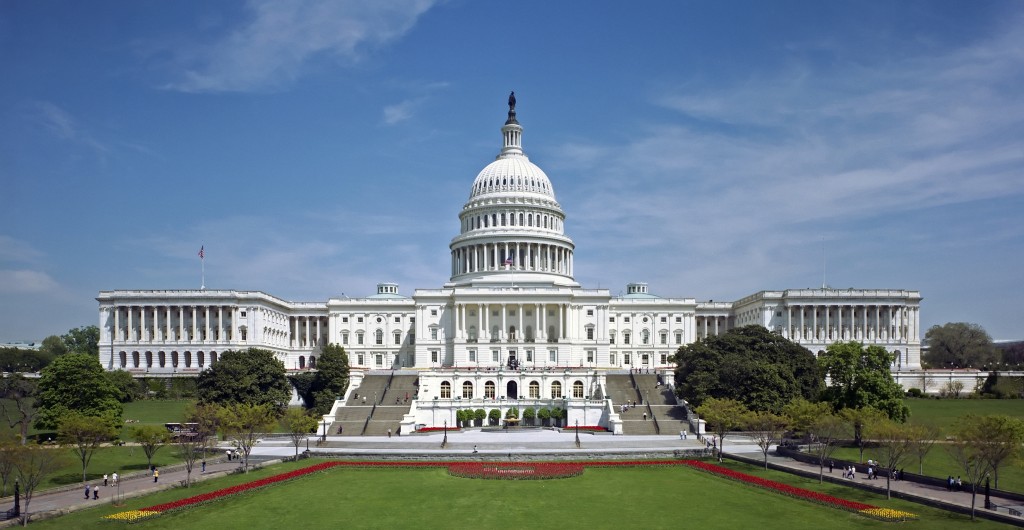
The U.S. House of Representatives returned on Monday after wrapping up last week with an explosive debate over a Confederate flag amendment in the Interior-Environment Appropriations Bill effectively stalling the House appropriations process just three weeks before the big August recess. This has forced leadership to scrap their previous plans and take the House Financial Services Appropriations Bill, which was expected to hit the floor this week, off the schedule as they work to solve the impasse. This puts the House Leadership goal of passing all 12 individual spending bills before the August recess in jeopardy. After Congress returns from the August recess, it will only have a few weeks before government funding runs out on Sept. 30, either forcing a continuing resolution (CR) or a risk a government shutdown. Appropriations aside, Monday House is in session and will consider several bills under suspension of the rules including H.R. 208: the Superstorm Sandy Relief Act, which requires the Small Business Administration to resume providing disaster loans to victims of Superstorm Sandy. Tuesday, the House will consider several more bills under suspension of the rules dealing with various financial regulatory issues. On Wednesday, the House is poised to take up H.R. 2898: the Western Water and American Food Security Act. The bill takes numerous actions intended to quickly increase the availability of water for agricultural, municipal and industrial users in California’s drought-stricken Central Valley. The House may may also consider a motion to go to conference on H.R. 644: Trade Facilitation and Trade Enforcement Act. Friday, the House is not in session.
Alabama prison reform counsel sought by Arizona
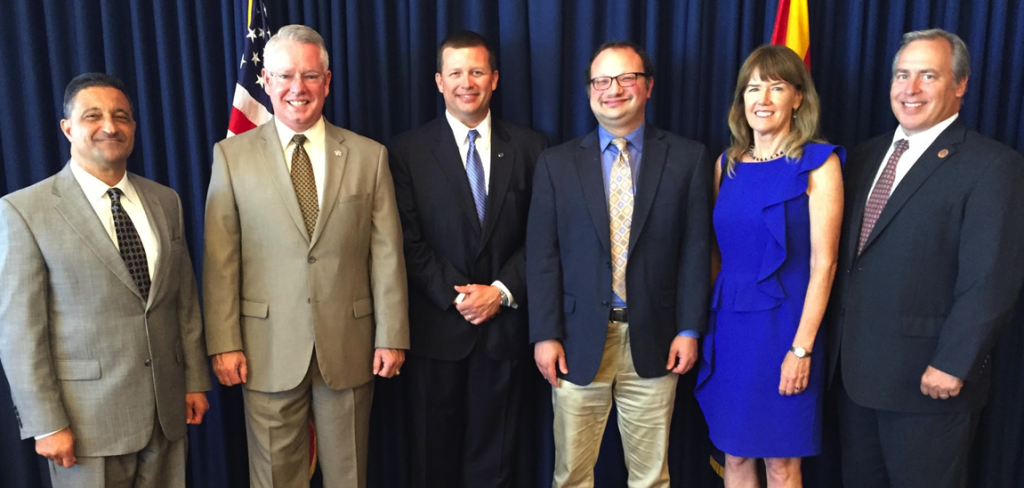
The architect of the Alabama Legislature’s recent prison reform overhaul, Republican Rep. Mike Jones of Andalusia, was invited by Arizona lawmakers to provide guidance as the Sunbelt state studies a similar slate of proposals. According to a release from the office of House Speaker Mike Hubbard, Jones spoke with Arizona policymakers including Joseph Cuffari, public safety advisor to Arizona Gov. Doug Ducey; Maricopa County Attorney Bill Montgomery; Yavapai County Attorney Sheila Polk; and state Sen. Adam Driggs, among others. The meeting is a sign of policy cooperation between the two conservative-leaning states. Gov. Robert Bentley signed SB 67 mandating the shift of some categories of nonviolent offenders out of the prison system into law in late May. The law also calls for more rehabilitation of inmates and aims to reduce the level of recidivism in Alabama as part of a larger national push for “smart justice,” as opposed to the traditional “tough-on-crime” regime popular until recently. Those policies, including mandatory minimums and longer sentences for possession and distribution of drugs, for instance, have clogged the nation’s prison systems and left millions locked up for years longer than previous practices dictated. The Alabama bill Arizona hopes to model will reduce Alabama’s prison population by some 4,200 inmates over the next five years, according to Sen. Cam Ward, who sponsored the bill in the Senate along as Jones helped maneuver it through the House. It will help shed prisoners from the rolls by a creating new low-level felony classification, Class D, which will apply reduced punishments for some property and drug crimes. The bill will also increase the number of Alabama’s incarcerated who are supervised away from a prison or jail. Experts estimate there are 24,678 inmates being housed in a framework built for 13,318, taxing the existing capacity by nearly double. “This is not the final end result,” Ward said to AL.com on the measure. “This is the first step in a long road we have ahead to fixing our corrections system.” The bill came as violence, including a recent riot at St. Clair Correctional Facility, has gotten the attention of the Alabama public and state government. Lawmakers said their proactive approach will help avoid federal intervention into the matter.
Presidential primary brief: 484 days until Election Day
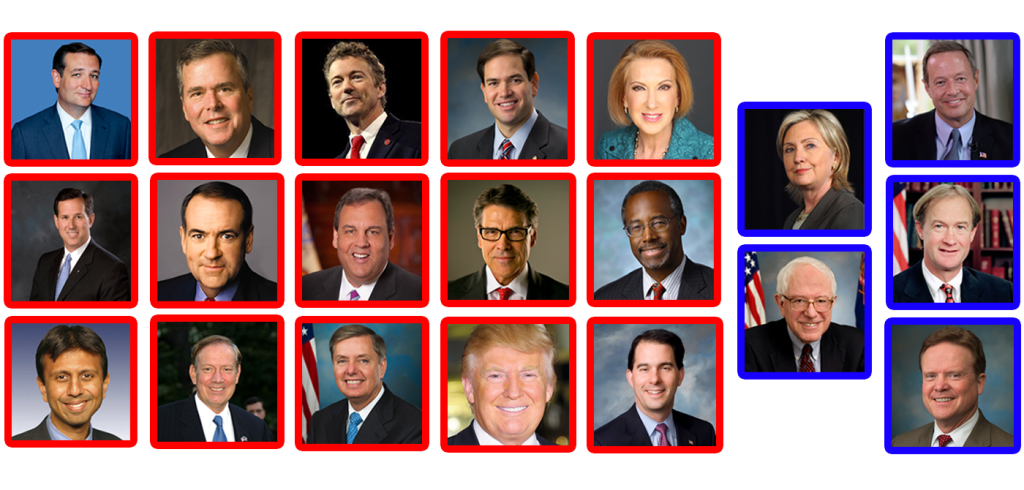
Welcome to the Monday presidential primary brief provided by Alabama Today. Every week you can find your latest headlines on the presidential primary races as we count down the days until Election Day. 230 days until AL Presidential Primary 484 days until Election Day Convention Dates: Republican July 18-21 2016, Democratic July 25-28 2016 Weekly Headlines: Scott Walker announces campaign blitz after 2016 announcement Republican Jim Gilmore to enter 2016 race for president Biden campaign team taking shape Press Clips: Global warming will play major role in 2016 presidential election (The Patriot News 7/12/15) Pope Francis in mid-June issued an encyclical calling for the world to combat global warming. It was developed with advice from the best scientists in the world, including world-‐famous British physicist/cosmologist Stephen Hawking. The Dalai Lama has endorsed the message. This will force a titanic, worldwide discussion on the issue — partly a scientific debate, partly a food fight from deniers, skeptics and people who honestly feel we have better things to spend our money on. Only one poll number right now tells us anything meaningful about the 2016 election (Washington Post 7/10/15) Although the 2016 election is nearly 500 days away, the nation — or at least the nation’s political junkies — remain hungry for news about the presidential campaign. But what news is there? Polls. So far — in 2015 alone! — no fewer than 57 polls have asked voters to choose between hypothetical nominees Republican Jeb Bush and Democrat Hillary Rodham Clinton. So it’s useful to be mindful that “trial heat” polls conducted now have zero ability to predict the winner of an election that’s 16 months away. Polls don’t even tell us much about primaries and caucuses that are six months away. Upcoming polls to lock in GOP debate Field (Politico 7/7/15) John Kasich may be the last Republican to enter the presidential fray, but his timing could be the best: Exactly two weeks after the splash of his planned announcement on July 21, Fox News Channel will average together the latest polls of the Republican Field and determine which 10 of the 16 announced candidates will participate in the First debate in Cleveland. Making the cut gives a candidate the platform to stand out in a crowded Field; not making the cut leaves him or her knocking on the door. Immigration reform key issue in 2016 election (USA Today 7/6/15) At her job at an investment management firm in small-‐town Nebraska, Analy Gonzalez is “constantly reminded” of the economic strain immigrant workers face. Gonzalez, who often works with migrant workers, says she sees firsthand the need for immigration reform, particularly for young immigrants. “Speaking about immigration reform is something that you grow up with having an immigrant family,” the 25-‐year-old says. “A lot of the people that I help are immigrants working really difficult jobs with no education, just trying to get by.” Jim Webb clarifies position on the Confederate flag (CBS News 7/9/15) Democratic presidential candidate and former Virginia Sen. Jim Webb said Thursday that the Confederate Flag at the South Carolina Capitol has “long been due to come down,” but he also called for some historical perspective on the issue, suggesting people should not use the debate over the flag to demonize the South. “The Confederate battle flag was a battle flag. It assumed a lot of unfortunate racist and divisionist overtones during the civil rights era,” Webb said in an interview on CBS This Morning, his first with a national broadcast outlet since announcing his candidacy earlier this month. The demographics of 2016 look brutal for Republicans (Washington Post 7/10/15) If you want to understand why the debates over the Confederate flag and Donald Trump’s immigration outbursts have so many senior Republicans reaching for their acid reflux pills, take a look at this bracing new demographic analysis from Charlie Cook and David Wasserman. Cook and Wasserman note that historical patterns should favor the GOP in the 2016 presidential election, because the same party rarely keeps the White House after previously holding it for two terms. But that advantage will be swimming upstream against these demographics. How Bernie Sanders plans to win and change Washington (CBS News 7/12/15) Sen. Bernie Sanders, I-Vermont, says he’ll be able to build a giant grassroots movement of support to win the Democratic nomination and the 2016 election, but that he’ll also go one step further than President Obama did successfully harness his grassroots support to change Washington. In an interview on CBS’ Face the Nation Sunday, Sanders said that the president ran “one of the great campaigns in the history of the United States of America” in 2008, but he also made a mistake by trying to negotiate fair compromises with Republicans and their leadership in Congress.
Alabama business roundup: Headlines from across the state

Here’s a roundup of some of the top weekend business headlines from across the state: Birmingham Business Journal: Birmingham top city for millennial renters Millennials have shown strong tendencies toward renting since the end of the Great Recession, but finding affordable rental housing and apartments has been a challenge in some of the nation’s largest metros. Birmingham, however, gives this generation more access to affordable rental properties than many of its peer metros, according to a report by Bloomberg. The report cited six cities that had the largest share of rental listings that millennials could afford, and Birmingham was No. 5 on that list. Just over 80 percent of the available properties listed the metro area are deemed within reach for most millennials, the report said. The top metro was St. Louis, followed by Birmingham, Kansas City, Missouri, Richmond, Detroit and Indianapolis. Birmingham Business Journal: Garry Drummond now the richest individual in Alabama There is a new name holding the enviable title of wealthiest person in Alabama. Garry Drummond, 77, whose net worth is an estimated $980 million, is now the richest individual in Alabama, according to a recent Forbes report. Drummond takes the spot formerly occupied by Marguerite Harbert, who died in March, as the richest individual in the state. H.E. Drummond – Garry’s father – started the H.E. Drummond Coal Co. in Sipsey, Ala. in 1935, taking a $300 loan from Walker County Bank in Jasper and providing three mules as collateral on the note, according to the company’s website. Garry Drummond began at his father’s business in 1961, after graduating with an engineering degree from the University of Alabama in Tuscaloosa. He became CEO in 1973, and has seen the coal firm grow into the largest privately-owned company in Alabama. Forbes reported that Drummond Co. has $3 billion in sales used for electricity and steel production. The company has coal reserves totaling more than 2 billion tons in Alabama and Colombia. Birmingham Business Journal: AM/NS Calvert to invest $88M in Mobile facility While other Alabama steel producers are reeling amid one of the worst downturns in the industry’s history, one firm is investing in its Mobile County operations. AM/NS Calvert LLC – which is a combined subset of ArcelorMittal and Nippon Steel & Sumitomo Metal Corp. – will invest $88 million in its north Mobile County facility in an effort to increase its presence in the automotive industry, according to a report from AL.com. Mobile County’s Industrial Development Authority on Thursday approved tax abatements totaling $8.5 million during the 20-year impact period. The requests represent about half a dozen different projects that are slated to begin immediately. The projects will be completed in phases through the close of 2016. The estimated capital investment of $87,556,015 includes about $77 million in machinery and equipment, in addition to incorporating about $24 million in local construction and engineering services. The project is expected to create six new jobs over the course of three years, with average annual salaries of $65,000. Luxembourg-based ArcelorMittal is the largest steel producer in world, and has felt the pinch of the steel downturn. However, while the company has acknowledged the market downturn, ArcelorMittal said in France, the company has hired 700 workers since reconfiguring the Florange steel plant, which could signal a resurgence in the steel market as the company expands. ArcelorMittal USA employs more than 20,000 workers at 27 operations across 13 U.S. states. NYTimes.com: Time Inc. to Move Test Kitchens to Alabama Time Inc., the nation’s largest magazine publisher, is moving almost all its recipe testing and other food editorial production for its 29 domestic magazines and websites to Birmingham, Ala., where it is building a food studio with 28 test kitchens, a dozen photography studios and a private dining room. The multimillion-dollar investment in the complex is part of a renewed commitment to food coverage for the nation’s largest magazine publisher, whose publications include People, Real Simple, Essence, Sports Illustrated and Travel & Leisure. Though some test kitchens in New York will close as a result, the move is seen as an expansion that will add about 44 jobs. “Excuse the pun, but the appetite for trusted, quality food content I don’t think has ever been richer than it is right now,” said Evelyn Webster, an executive vice president. “It’s not just people for whom food has always been a reflection of their lifestyle. It’s this whole new breed of enthusiasts who are coming into our market.” The company struggled after Time Warner spun it off a year ago and it went public. It trimmed operations and personnel and looked for ways to preserve its print heritage while staying competitive on an increasingly cluttered and constantly changing digital playing field. The food studios will fill 40,000 square feet in one of three buildings on a 28-acre campus that Time Inc. sold last year to Samford University. It is leasing back the building that will hold the studios, as well as the offices of Southern Living, Cooking Light and Coastal Living, which are already produced there. At the same time, Food & Wine, which Time Inc. bought in 2013 and whose profile soared when it teamed up with the television show “Top Chef,” will have its own new test kitchen and studio in New York when the company moves downtown from its longtime perch in the Time & Life Building in Rockefeller Center this year. Sunset, the company’s magazine dedicated to cooking and gardening on the West Coast, is also getting new offices and kitchens in Oakland and Sonoma Counties in California. Time Inc. sold the midcentury Sunset headquarters in Menlo Park, Calif., which was designed by the architect Clifford May, for an estimated $78 million in 2014. The moves are part of an increased emphasis on quality recipes, polished food websites and increased cooking coverage in both traditional and digital media. It comes after a fallow period in publication test kitchens that was punctuated by the closing of Gourmet magazine and its kitchens in 2009 and the
Angi Stalnaker: Why e-cigarette tax proposal is shortsighted

The upcoming Special Session is likely to have its share of political drama and made for TV nightly news antics but in the end, it is incumbent that we all remember that every law that is passed and every law that fails in this, and every other legislative session has a very real world impact on the very real citizens of Alabama. Laws can help the people of this state and laws can hurt the people of this state. It all depends on the choices that the 140 elected men and women of the Alabama House and Senate make. In his call, Gov. Robert Bentley is asking those very men and women to pass a tax on e-cigarettes, vapors and related products. (The specifics of that legislation will not be known until the bill is actually filed.) He is asking them to lump these products in with a tax on tobacco and to treat them as similar products. That makes about as much sense as passing a bill to tax fast food and adding apples and bananas to the mix. Tax fast cars and add a Model T to the list. E-cigs and vapor products have nothing in common with cigarettes and to treat them as similar products in order to raise revenue is not only misguided, it stands to hurt thousands of Alabamians. Vapors and e-cigarettes are not tobacco products. They produce no smoke. There is no flame involved. No lighters, no igniter, no flame is to be found anywhere with these items. They don’t produce smoke. They emit water vapor. That’s right: water vapor. There is a lot of misinformation about these products and lawmakers should make every effort to educate themselves on the facts before passing such a misguided law: Myth: Vapors and e-cigarettes are just another form of smoking Fact: Numerous medical studies show that vapors and e-cigarettes are not smoking. In fact, just the opposite is true. Studies show that vapors and e-cigarettes are among the most effective smoking cessation (quitting smoking) products available. Even the American Heart Association’s Circulation Journal published a 2014 study that determined that the smoking cessation success rate for former smokers who use vapor nicotine products was substantially higher than other nicotine replacements therapies including nicotine gun, patches and lozenges. Myth: The vapors from these products cause harm to those around users much like second-hand smoke Fact: The output is simply water vapor and is completely harmless. Myth: Vapors and e-cigarettes encourage non-smokers to smoke. Fact: Longitudinal studies show that less than 3 percent of people who have never smoked cigarettes will try an e-cigarette or vapor product. Myth: Driving these companies out of business won’t hurt the economy. Fact: More than 2,000 Alabamians are employed as a result of the e-cigarette and vapor business. That is more people than will be employed by Remington and almost four times as many people as will be employed by Google’s Alabama location. These are real Alabamians that are at risk of losing their jobs if this tax passes. Myth: Taxing vapors and e-cigarettes will generate revenue for the state of Alabama Fact: Overwhelming evidence shows that imposing a tax on e-cigarettes and vapor products will make them too expensive and will force many who have stopped smoking in favor of vapor and/or e-cigarettes to return to smoking cigarettes due to the cost. This will have a net negative effect on the Medicaid budget for the state which will shoulder a portion of the cost of the health issues of those who returned to smoking cigarettes. Tens of thousands of Alabamians who have tried everything to quit smoking and who have repeatedly failed have found success with the assistance of vaping. They have, once and for all, put down their deadly and costly cigarette habit in favor of a much healthier alternative. They are now far less likely to develop lung cancer and other diseases than they were when they were tobacco users. They develop fewer lung infections and can breathe easier. Their children are no longer impacted by the harmful effects of second-hand smoke. They are healthier and Alabama is healthier because they have given up cigarettes. Now, we want to tax them? Why? In his press conference, Bentley stated that he was including e-cigs in his smoking tax legislation because “they contain nicotine.” That is true. Many smoking cessation products contain nicotine so why aren’t products like Nicorette gum and other nicotine replacement therapies included in this schizophrenic proposal? Nicorette is far less effective at ending a smoking addiction than e-cigarettes are so it would actually do less harm to Alabamians to tax that product instead. It would still be ridiculous, but less so that a vaping tax. You can just add that to the list of things that don’t make sense about this bill. If the legislature, in all its wisdom, chooses to pass a tax on e-cigs and vaping products, they will be making horrible public policy. They will be telling people like Stephanie, a cancer survivor and single mother from Birmingham, that they don’t care that she won’t be available to afford the e-juice that keeps her from smoking cigarettes and that, in fact, keeps her alive. They will send a signal to everyone who has quit and everyone who will quit using vapor products that taxing the products is more important than their very lives. They are telling 2,000 employees and more than 100 retail store owners that they don’t matter. The saddest part is that, in the end, the vaping tax will actually cost Alabama’s general fund much more money that it will ever raise. As people fall back into smoking cigarettes, they will be more likely to develop expensive and lethal diseases that will kill them. The treatments are expensive and Medicaid, which is funded by the already overburdened General Fund, will shoulder most of the cost. A lot of things about government don’t make sense but this absolutely takes the cake. Quitting smoking is
Scott Walker reminds voters of union wins as he enters 2016 race

Wisconsin Gov. Scott Walker announced on social media Monday morning that he’s running for president, tweeting “I’m in.” Walker, a Republican who built a national profile largely due to his clashes with labor unions, also released a campaign video at the same time declaring his entry in the race. The video is heavy on images of Walker speaking to a crowd in an Iowa cornfield, as well as his 2010 battle with unions. The video includes Walker speaking directly to the camera touting his willingness to take on big fights. “We didn’t nibble around the edges,” he says. Walker has a national profile largely due to his clashes with labor unions. He enacted policies weakening their political power and became the first governor in U.S. history to defeat a recall election. Now, on the eve of his campaign launch, Walker’s task is to remind Republican voters about the four-year-old fight and the recall election sparked by his efforts to weaken unions — and a series of lesser-known triumphs he says set him apart from the crowded Republican field. “If you could accomplish half of what he’s done in Wisconsin in Washington, D.C., you would go down as one of the greatest presidents ever,” said Walker’s top political adviser Rick Wiley. Walker cut income and corporate taxes by nearly $2 billion, lowered property taxes, legalized the carrying of concealed weapons, made abortions more difficult to obtain, required photo identification when voting and made Wisconsin a right-to-work state. His budget this year, which plugged a $2.2 billion shortfall when he signed it into law Sunday, requires drug screenings for public benefit recipients, expands the private school voucher program, freezes tuition at the University of Wisconsin while cutting funding by $250 million and removing tenure protections from state law. Such achievements may appeal to conservatives who hold outsized sway in Republican primaries, yet some could create challenges in a general election should Walker ultimately become the GOP’s nominee. Voter ID laws, abortion restrictions, liberal gun policies and education cuts are not necessarily popular among swing-state independents. “Ultimately Walker has to show all these victories and political successes have shown real results,” said Democratic pollster Paul Maslin. Walker’s record is well-known to Wisconsin voters, a state where the second-term governor engenders fierce loyalty and fierce opposition. Protesters who first crowded the state Capitol in 2011 in demonstrations as large as 100,000 still gather daily, although only about a dozen or so at a time, to sing anti-Walker songs. Anger over Walker’s 2011 union law led to the failed 2012 recall. His team created a video this week, called “Recall the Recalls,” to tell that story again, especially for those who are taking their first serious look at Walker as a presidential candidate. And while he’s not yet a presidential candidate in the eyes of the law, the labor dispute helped give him a significant head start in the 2016 money race. Walker’s three governor’s races left him with a far-reaching donor database of more than 300,000 names. He shattered state fundraising records, collecting $83 million for his three Wisconsin elections, much of it coming from outside the state. He begins his 2016 presidential bid with at least $20 million to spread his message, raised by two outside groups not subject to campaign finance donation limits, according to sources with direct knowledge of the fundraising operation. They spoke on the condition of anonymity to publicly discuss private fundraising strategy. Walker’s union clashes will be featured prominently on the day of his announcement, to be held in the same convention hall where he hosted his victory party after the recall election. “A lot of people, that was their first introduction to Walker,” Wiley said, calling the union battle and subsequent recall win “one of our biggest assets.” Yet the specific impact of Walker’s fight with labor unions is open to debate. The governor often highlights rising test scores and graduation rates as evidence that the 2011 union law worked. What he doesn’t mention is Wisconsin’s graduation rates were increasing for years before he took office, and the recent growth is not as strong as the national average. Wisconsin’s ACT scores have been among the best in the nation since before Walker was elected. They ranked third the year before he took office and ranked second in 2012. Walker also talks about how the 2011 union law saved taxpayers $3 billion as of late 2014, saying state and local governments have used “tools” he provided them to reduce spending on pensions and health benefits for public employees. While it’s true that the state and local governments have saved roughly that amount, the costs have been shifted to the employees who have to pay more for those benefits. Critics note that Walker too often ignores where he’s fallen short. The state’s chief economic development agency that Walker created, a hybrid public-private partnership, has been beset with problems, including handing out $124 million in loans without properly vetting the recipients. Walker was over 100,000 jobs short on his signature 2010 campaign promise to create 250,000 private-sector jobs. Wisconsin’s job growth has lagged not only the national average but its Midwest neighbors as well. He’s also been dogged by two investigations, neither of which have yet to result in charges filed against him. The first resulted in a variety of criminal convictions, including misconduct in office, against six of his former aides and associates when he was Milwaukee County executive. The second investigation, currently on hold while the state Supreme Court considers a trio of lawsuits, centers on whether Walker’s recall campaign illegally coordinated with independent groups. Republished with permission of the Associated Press.


